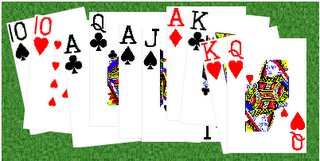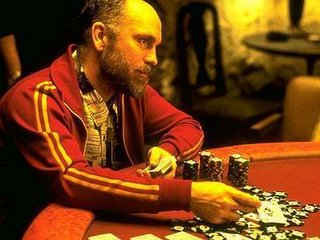 I had a lot of fun tonight. I went to Sycuan on the shuttle bus. My wife stopped by on her way home from work. After we chatted a few minutes I boarded the bus for the casino. She said it was really weird seeing me leave in my shorts and T-Shirt wearing my Poker Cap from the WSOP. (Of course only in Southern California, would you be wearing shorts & a T-shirt in January.) She laughed at me and said it was like I was going off to camp with my friends.
I had a lot of fun tonight. I went to Sycuan on the shuttle bus. My wife stopped by on her way home from work. After we chatted a few minutes I boarded the bus for the casino. She said it was really weird seeing me leave in my shorts and T-Shirt wearing my Poker Cap from the WSOP. (Of course only in Southern California, would you be wearing shorts & a T-shirt in January.) She laughed at me and said it was like I was going off to camp with my friends.I usually take my Ipod and a book. Today was no exception.
The book I took was the Book of Bluffs by Lessinger, a columnist for Card Player magazine.
 I had a lot of fun taking it out and reading it for a few minutes at the 2/4 N/L table. There was a lot of discussion about whether I was using it to bluff more or bluff less. I actually did bluff a lot more than I usually do and it paid off tonight. It was a good table, I caught some good cards and my reads of other players hands was right on. There is nothing I enjoy doing more then being in the moment, with those combination of events occurring around me. Obviously, it paid off nicely too.
I had a lot of fun taking it out and reading it for a few minutes at the 2/4 N/L table. There was a lot of discussion about whether I was using it to bluff more or bluff less. I actually did bluff a lot more than I usually do and it paid off tonight. It was a good table, I caught some good cards and my reads of other players hands was right on. There is nothing I enjoy doing more then being in the moment, with those combination of events occurring around me. Obviously, it paid off nicely too.Monday night there is a free entry tournament and I picked up a card to play in it, but when it came time to play I was doing so well I gave my card away and stayed at the 2/4 N/L table.
I did catch pocket 5’s in the big blind and I wish I would have raised on them. The flop came two 5’s & a 10. I had flopped four 5’s.! Had I raised it would have made sense to bet out. But, I thought I better check and two seats to my left raised $25 and the player to his left raised to $75. I called the $75 and the original raiser dropped out. I checked the 7 that came on the turn turn and he checked also. The river Queen came and I bet out $25 he folded. I should have had the patience to check the river also he might have tried to bluff.
I learn something almost every time I play this game. There seems to be no end to the variations of possibilities that can occur. I wish I could say I correct after making a mistake but it usually takes me a few times of repeating the same mistake until I get it figured out.
I also had an unusual occurrence. A casino manager asked me if I could lend him $300 until the weekend. People are always trying to borrow money at poker rooms and I have been asked about 3 times before. I said no twice, but I did lend one player I trusted $10 he said, he needed for gas money to get home. He paid me back the next time I saw him and thanked me again.
I hear it is usually a bad idea to lend money to gamblers, but I am interested to see how this manager handles this situation. I obviously have concern about losing the money, but I don’t think that is really going to happen. I just can’t imagine playing so close to your edge that you need to borrow money. I am playing only on my winnings as my bankroll and I never put more then 10% of it at risk at any one time.
 By the way in case you didn’t know it Casino Dealers play poker also. I would think they would as a “class of players” be better then they are, because of all the plays they witness. But, in my experience most of them are pretty average players.
By the way in case you didn’t know it Casino Dealers play poker also. I would think they would as a “class of players” be better then they are, because of all the plays they witness. But, in my experience most of them are pretty average players.There have been times that I have seen my improvements over time. Usually it is very hard for me to see my play improve. Some people try to use short term winning results to claim their play is improving, but a standard deviation in propability usually accounts for that, so short term results are a poor basis to measure improvement.
So how do I then measure improvement? I do admit it is difficult and subjective, but the last two times I went to Vegas where the play is overall better then most places I have heard comments about my play, I had never hear before and I have self-observed my play being more “correct” more often.
Up until a month ago I had more confidence in my limit game then I non-limit game which is harder to learn. About three months ago I didn’t feel like I could “beat the game” in N/L, I had to admit many of my wins were based on luck more then really good play. I also did not have a very clear read on what other players could or did have when they called me. I can see much “clearer” other hands my opponents might have and I am more confident in perceiving opportunities to bluff or play selective aggression in No Limit. This new sense of “confidence” is helping my game and encouraging me to go back and re-read some of the books and improve my game even more.
Next weekend will be the one year anniversary of my decision to become a professional player.
I am not yet ready to summarize what I have learned yet this year, however, this blogger at http://cardsspeak.servebeer.com/archives/year_in_review.html
He says the top ten things he learned in his 1st year are the following in no particular order.
When moving up in limits, pretend that you're starting over from scratch. The game changes so much from $3-6 to $5-10 and $5-10 to $10-20 that you really need to go back to the basics and be open to learning the new game.
If you are an online player and were playing multiple tables at a lower limit, play a single table at the new limit for a while before trying to play 2.
Fight hard to be performance oriented. If you're committed to the game, results are irrelevant. As long as you're properly bankrolled to play, you shouldn't worry about results. Good performance will get the money in the long run.
Have a stop loss limit. A lot of people argue against this, but I've seen very few players who can play their best game after losing more than 35 big bets. Of course, if you've truly gone beyond results-oriented thinking and can focus solely on performance, than you don't need a stop loss. Like I said, this is extremely rare.
Do things Poker should be fun, and if you are playing the same game the same way for hours and hours every week, you need to do things to "shock your system" that force you to improve your game. Take an occasional shot at a bigger game if your bankroll can handle it. Drop down in limit and play looser than your normally do. Change your game temporarily and you'll come back to your regular game rejuvenated with new tools to beat the game.
Review your play. If you're an online player, use PokerTracker to review your sessions after you've left the table. It takes 15 minutes to review a 3 hour session, and will drastically improve your game.
Celebrate your good performance, and be critical of your bad plays. Personally, I tend to focus on my mistakes, and end up beating myself up for a single bad play even if the rest of the session I played perfect poker. Everybody makes mistakes, so lighten up on yourself.
Make the most of your time at the table. When you're not in a hand, try to put other people on hands, or think about the last pot you played and what you did right or wrong. If you're going to play poker, don't read a book or watch tv.
Read. A few hours spent reading a poker book can give you a new perspective on the game, and is often worth much more than just a few hours at the table.
Create an environment conducing to winning. Time is precious, and it's often difficult to set aside a block of time to play poker. Time is precious, and it's often difficult to set aside a block of time to play poker. In the past, I found myself logging on to play a few orbits while dinner was in the oven and my attention wasn't fully on the game. If you don't have a block of time where you aren't going to be disturbed, don't play.
Find some people who you can talk to about poker. When the cards go cold for weeks, and your bankroll is being depleted by bad beats, it can be tough to sit down at the tables and face the poker gods alone. It helps to have a perspective of the game other than your own.

No comments:
Post a Comment